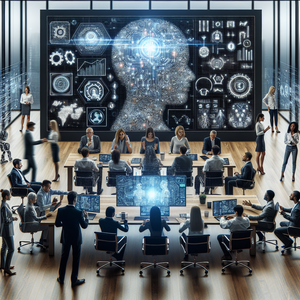The Last Data Scientist: A Speculative Look at the Future of Human Expertise in an AI-Dominated World

To understand how data scientists could potentially become obsolete, it is essential to explore the transformative forces reshaping the field. At the heart of these changes is the rapid development of AI technologies that are increasingly automating the tasks traditionally performed by humans. Tools like AutoML and no-code platforms are democratizing access to data science capabilities, reducing the need for specialized human intervention. AI systems are evolving to think strategically and creatively, proposing novel hypotheses and designing experiments. Machines process data at speeds and scales far beyond human capability, making fully autonomous AI systems a default choice for efficiency and scalability.
The Ethical and Practical Ramifications of a Machine-Dominated Future
While the prospect of machines outperforming humans in data science may seem like a technological triumph, it raises profound ethical and practical concerns. AI systems, if left unchecked, could perpetuate biases and amplify systemic inequalities. The 'black box' nature of advanced AI systems undermines transparency and accountability, creating power imbalances. Delegating decision-making to machines risks eroding human agency, making society a passive observer rather than an active participant in its evolution.
The Role of the Last Data Scientist
In a hypothetical future where machines dominate the field of data science, the last human data scientist would evolve into a guardian of humanity's values and ethics. They would champion ethical AI, bridge the gap between humans and machines, act as a whistleblower, and educate future generations about AI's limitations and ethical implications. This role would ensure that AI serves human interests rather than supplanting them.
A Hybrid Future: Humans and Machines in Collaboration
Rather than envisioning a world where human data scientists disappear, we can imagine a future where humans and machines collaborate to achieve more. AI could augment human expertise, freeing data scientists from mundane tasks to focus on high-level problem-solving. Regulations could mandate human oversight in critical areas, ensuring ethical alignment. The role of data scientists could shift to strategic leadership, guiding organizations through the challenges of AI adoption.
The concept of 'The Last Data Scientist' serves as both a cautionary tale and a call to action. It challenges us to reflect on technological change and preserve the human element in a world increasingly shaped by machines. By fostering collaboration, championing ethical principles, and prioritizing transparency, we can ensure that data science remains a uniquely human endeavor, even as technology evolves.
AI Ethics Specialist
Technology companies like Google, Microsoft, and OpenAI; consulting firms; NGOs focused on technology ethics
Responsibilities and Skills
Develop frameworks to ensure AI systems are aligned with ethical principles such as fairness, transparency, and accountability.
Conduct audits of machine learning models to identify and mitigate bias in training data and algorithms.
Work closely with cross-functional teams (engineers, product managers, policymakers) to embed ethical considerations into AI development.
Stay informed about evolving AI regulations and ethical standards to ensure compliance.
Unique Qualification
Expertise in both machine learning and ethical theory, with a strong understanding of global AI regulations.
Machine Learning Operations (MLOps) Engineer
Cloud service providers like AWS and Azure, AI-driven startups, financial institutions
Responsibilities and Skills
Build and deploy scalable machine learning pipelines to automate the end-to-end lifecycle of AI models.
Monitor AI systems in production to ensure reliability, efficiency, and compliance with performance benchmarks.
Collaborate with data scientists to transition models from research to production environments.
Optimize infrastructure for high-speed data processing and resource management.
Unique Qualification
Proficiency in tools like Kubernetes, Docker, and TensorFlow Extended (TFX), along with cloud computing expertise.
Algorithm Transparency Analyst
Government agencies, auditing firms, tech companies with AI products
Responsibilities and Skills
Investigate the 'black box' nature of AI models to improve interpretability and explainability for non-technical stakeholders.
Develop tools or visualizations to make machine learning predictions more accessible and understandable.
Collaborate with legal and compliance teams to ensure algorithmic decisions meet regulatory standards.
Identify and mitigate risks posed by opaque AI systems, focusing on accountability.
Unique Qualification
Background in both data science and human-computer interaction (HCI), with a focus on explainable AI (XAI).
Automated Machine Learning (AutoML) Specialist
SaaS companies, enterprise software providers, and organizations implementing no-code AI solutions
Responsibilities and Skills
Design and customize AutoML tools to streamline the data science workflow for non-technical users.
Evaluate the performance and limitations of AutoML systems, ensuring they meet organizational needs.
Train and support teams in using AutoML platforms, bridging gaps in technical expertise.
Work on optimizing feature engineering and hyperparameter tuning within automated frameworks.
Unique Qualification
Deep understanding of AutoML platforms like H2O.ai, DataRobot, or Google Cloud AutoML, combined with experience in traditional data science.
AI Policy Advisor
Policy think tanks, government agencies, international organizations like the UN or OECD
Responsibilities and Skills
Advise governments, corporations, and international organizations on AI policy, focusing on ethical and societal impacts.
Analyze the implications of AI technologies on privacy, employment, and equity to inform policy recommendations.
Collaborate with technical teams to translate complex AI concepts into actionable policy insights.
Advocate for regulations that ensure human oversight in critical AI applications (e.g., healthcare, criminal justice).
Unique Qualification
Strong interdisciplinary expertise in law, ethics, and AI technologies, with a focus on public policy.


